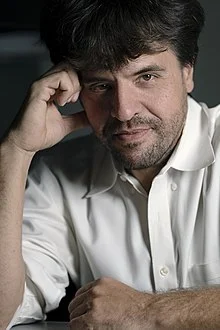
Dr. Karl Deisseroth
Karl Deisseroth is a distinguished neuroscientist and bioengineer renowned for his groundbreaking contributions to the fields of optogenetics and neuroscience. Born on November 18, 1971, in Boston, Massachusetts, Deisseroth obtained his medical degree from Stanford University and a Ph.D. in neuroscience from Stanford Medical School. Deisseroth's pioneering work in optogenetics has revolutionized our understanding of the brain. He developed a technique that allows the precise control of neurons using light, enabling researchers to study and manipulate brain circuits with unprecedented precision. His innovations have opened new avenues for understanding the neural basis of behavior, mental health disorders, and neurological diseases. As a Howard Hughes Medical Institute investigator and a professor at Stanford University, Karl Deisseroth continues to push the boundaries of neuroscience and bioengineering, earning numerous awards and accolades for his impactful research. His work not only advances our knowledge of the brain but also holds the promise of transformative therapies for neurological conditions.
Exploring the Mind with Dr. Karl Deisseroth: Breakthroughs and Insights in Neuroscience and Psychiatry
Andrew Huberman, a professor at Stanford School of Medicine, introduces Dr. Karl Deisseroth, a renowned psychiatrist and research scientist. Deisseroth’s clinical work focuses on treating various nervous system disorders, and his laboratory has pioneered innovative technologies like channelopsins to control neurons with light, revolutionizing our understanding of the brain and psychiatric illness.
The Transformative Impact of Channelopsins
Channelopsins, proteins from algae, have been revolutionary in neuroscience. When introduced into human and animal nervous systems, they allow precise control of neurons with light. This breakthrough offers a more targeted approach compared to traditional drug treatments, promising transformative changes in treating psychiatric illnesses and movement and perception disorders. Deisseroth’s work led to a groundbreaking application where a blind person perceived light for the first time through channelopsins.
Insights from “Projections: A Story of Human Emotions”
Dr. Deisseroth’s book, “Projections,” delves into the human brain’s workings in health and disease, narrated through stories of patient interactions. It reflects on the motivations behind the discovery of groundbreaking technologies like channelopsins, providing a unique perspective on treating nervous system disorders and understanding human emotions and consciousness.
The Evolution and Future of Psychiatric Treatments
Psychiatric treatments have evolved remarkably, with many therapies offering substantial benefits. However, a significant challenge remains in the lack of specificity. Treatments like electroconvulsive therapy, while effective, affect the entire brain, leading to a quest for more targeted approaches. Understanding specific neural circuits and patterns can pave the way for precise treatments, possibly utilizing technologies like optogenetics for more focused and effective interventions.
The Promise of Optogenetics in Clinical Applications
Optogenetics, with its ability to control specific neurons, holds immense promise for clinical applications. This technology might revolutionize treatments for conditions like depression, where specificity could lead to more effective and side-effect-free therapies. The journey from understanding to application involves identifying the right targets and developing safe methods to deliver light and genes into specific body parts or brain regions.
The Intricacies of Psychiatric Treatment and the Promise of Optogenetics
In a riveting conversation, Dr. Karl Deisseroth, a pioneering psychiatrist and neuroscientist, delves into the complex world of psychiatric treatment and the promise of optogenetics. He discusses the paradox where the most effective psychiatric medications often have the most side effects, highlighting the delicate balance between efficacy and safety in psychiatric care. Deisseroth envisions a future where precise, patient-specific treatments are possible, thanks to the deep understanding of brain circuits provided by optogenetics.
The Ethical and Clinical Implications of Optogenetics
Dr. Deisseroth explores the ethical and clinical implications of introducing optogenetics into human treatment. He stresses the importance of specificity and understanding in applying such advanced technology, envisioning a future where medications are tailored to individual circuit dysfunctions. This approach promises to revolutionize psychiatric treatment, moving away from serendipitous discoveries to targeted, causality-based interventions.
The Vision for a Less Invasive Future in Psychiatry
Discussing the future of psychiatric treatment, Dr. Deisseroth expresses a preference for less invasive methods like medications over surgical interventions. He believes that with a deep understanding of the brain’s circuitry and the precise role of each component, medication development can become more focused and effective. This vision is grounded in the hope that a profound understanding of brain function will lead to better, more specific treatments for psychiatric conditions.
Brain-Machine Interfaces: The Intersection of Technology and Psychiatry
Brain-machine interfaces represent a fascinating intersection of technology and psychiatry. Dr. Deisseroth discusses the potential of these devices to help understand and treat psychiatric conditions. He envisions a future where closed-loop systems detect early signs of psychiatric symptoms and intervene in real-time, offering a more efficient and principled approach to treatment. This promising avenue could significantly enhance the understanding and management of psychiatric disorders.
The Complexities and Potential of Treating ADHD
ADHD, a disorder characterized by inattention and hyperactivity, presents a unique challenge in psychiatry. Dr. Deisseroth touches on the ongoing debates about its treatment and diagnosis, discussing the potential of quantitative EEG-based diagnoses. He emphasizes the importance of ensuring that symptoms present across different life domains before considering treatment, highlighting the nuanced approach required in managing ADHD.
Dissociation and the Power of Learning from Altered States
Dr. Deisseroth sheds light on dissociation, a state where individuals feel detached from their sense of self and body. He discusses the potential of psychedelics and MDMA to temporarily induce altered states, leading to profound learning experiences. These experiences can help patients see new possibilities and break free from rigid patterns of thought, offering a unique therapeutic avenue for conditions like depression and PTSD.
